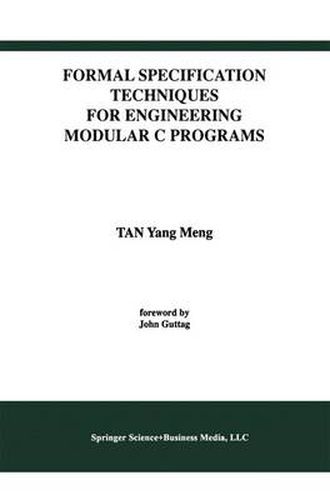Readings Newsletter
Become a Readings Member to make your shopping experience even easier.
Sign in or sign up for free!
You’re not far away from qualifying for FREE standard shipping within Australia
You’ve qualified for FREE standard shipping within Australia
The cart is loading…






This title is printed to order. This book may have been self-published. If so, we cannot guarantee the quality of the content. In the main most books will have gone through the editing process however some may not. We therefore suggest that you be aware of this before ordering this book. If in doubt check either the author or publisher’s details as we are unable to accept any returns unless they are faulty. Please contact us if you have any questions.
Software is difficult to develop, maintain, and reuse. Two factors that contribute to this difficulty are the lack of modular design and good program documentation. The first makes software changes more difficult to implement. The second makes programs more difficult to understand and to maintain.
Formal Specification Techniques for Engineering Modular C Programs describes a novel approach to promoting program modularity. The book presents a formal specification language that promotes software modularity through the use of abstract data types, even though the underlying programming language may not have such support. This language is structured to allow useful information to be extracted from a specification, which is then used to perform consistency checks between the specification and its implementation.
Formal Specification Techniques for Engineering Modular C Programs also describes a specification-driven, software re-engineering process model for improving existing programs. The aim of this process is to make existing programs easier to maintain and reuse while keeping their essential functionalities unchanged.
Audience: Suitable as a secondary text for graduate level courses in software engineering, and as a reference for researchers and practitioners in industry.
$9.00 standard shipping within Australia
FREE standard shipping within Australia for orders over $100.00
Express & International shipping calculated at checkout
Stock availability can be subject to change without notice. We recommend calling the shop or contacting our online team to check availability of low stock items. Please see our Shopping Online page for more details.
This title is printed to order. This book may have been self-published. If so, we cannot guarantee the quality of the content. In the main most books will have gone through the editing process however some may not. We therefore suggest that you be aware of this before ordering this book. If in doubt check either the author or publisher’s details as we are unable to accept any returns unless they are faulty. Please contact us if you have any questions.
Software is difficult to develop, maintain, and reuse. Two factors that contribute to this difficulty are the lack of modular design and good program documentation. The first makes software changes more difficult to implement. The second makes programs more difficult to understand and to maintain.
Formal Specification Techniques for Engineering Modular C Programs describes a novel approach to promoting program modularity. The book presents a formal specification language that promotes software modularity through the use of abstract data types, even though the underlying programming language may not have such support. This language is structured to allow useful information to be extracted from a specification, which is then used to perform consistency checks between the specification and its implementation.
Formal Specification Techniques for Engineering Modular C Programs also describes a specification-driven, software re-engineering process model for improving existing programs. The aim of this process is to make existing programs easier to maintain and reuse while keeping their essential functionalities unchanged.
Audience: Suitable as a secondary text for graduate level courses in software engineering, and as a reference for researchers and practitioners in industry.